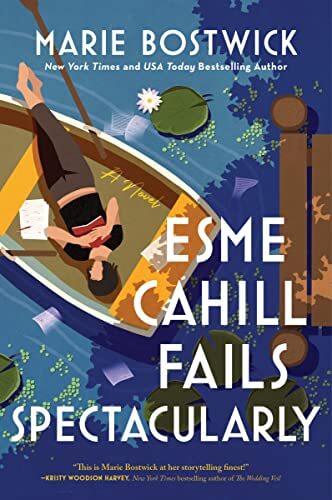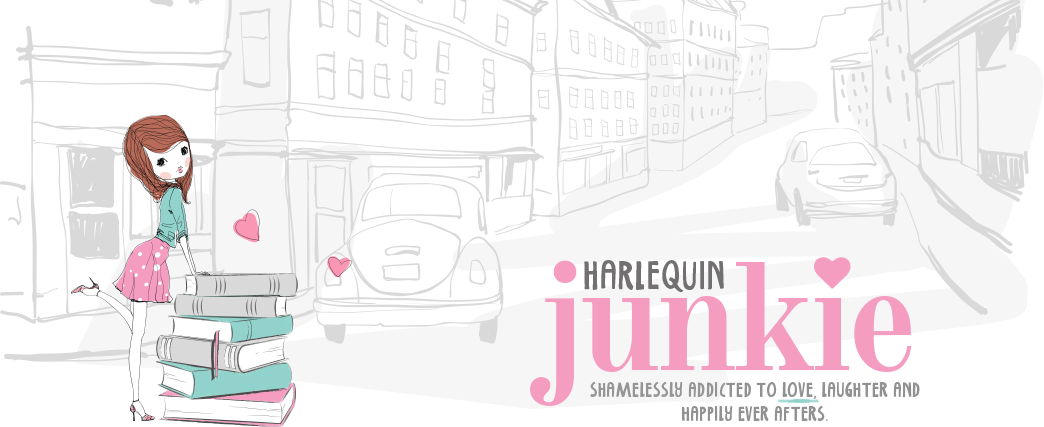Today, HJ is pleased to share with you Marie Bostwick’s new release: ESME CAHILL FAILS SPECTACULARLY
A novel about the meaning of family and the places we call home.

Set amidst the stunning landscape of Asheville, NC, Esme Cahill returns Esme Cahill returns to her childhood—from New York City, where she was fired from her publishing job, divorced from her husband—at the request of her late grandmother, Adele, who dies suddenly before Esme arrives.
While she finds her footing in a place she hasn’t been back to in years, Esme finds the once-charming lakeside retreat run by her family is sliding toward financial ruin. With her grandfather George, estranged mother Robyn, and a travelling chef Dawes, they set out to rebuild their family’s legacy. In the attic, Esme unearths a trove of museum-worthy art quilts, sewn by Adele. Piecing together the inspiration behind them, Esme discovers a forgotten chapter in her grandmother’s untold story, that of a gifted artist who never received her due.
If you love “southern summer” fiction authors like Mary Alice Monroe and Kristy Woodson Harvey you’ll love this delicious novel about family, friendship, and finding your true path in life.
Enjoy an exclusive excerpt from ESME CAHILL FAILS SPECTACULARLY
From ESME CAHILL FAILS SPECTACULARLY. Copyright © 2023 by Marie Bostwick. Publication May 30, 2023 by William Morrow, an imprint of HarperCollins Publishers. https://mariebostwick.com/
It was an ordinary cardboard box, the kind people use to store files. Adele, my grandmother, had written “Save For Esme” on the top with red marker, secured it with double loops of string. I carried it down to the lobby; my mother Robyn trailed behind. When we came downstairs, my grandfather George, who was standing near a wall of shelves in the canteen, stocking a basket with candy bars, looked up.
“You found it? What’s inside?”
“I don’t know yet. Should we take a look?”
I set the box on the floor. George fished out his pocketknife and handed it to me. I sawed at the strings, wondering what it might contain, certain that whatever it was must be remarkable and important. What could it be?
Family heirlooms? Quilts? A trove of letters she’d penned but never mailed, explaining the secret of life? Jewelry? A velvet bag of gold doubloons?
Unlikely, but a few doubloons would have come in pretty handy just then. And one of the first stories I’d ever written, when I was eleven, featured just such a circumstance. The characters lived happily ever after, naturally. Wouldn’t it be nice if we could do the same?
As George and Robyn looked on, I cut the last string, removed the lid, and peered inside. Instead of gold coins and happy endings, the box was mostly filled with paper.
There was an envelope of yellowed newspaper clippings arranged in no particular order. Another held recipes written on an odd collage of papers and cards. Sorting through them, I found the shrimp and grits preparation she’d taught me before I left for New York, scribbled on the back of an old Christmas card. On a torn sheet of construction paper, the kind kids use for art projects, I discovered the recipe for caramel cake she’d made on my first day at the lake and all my subsequent birthdays. Adele had a habit of grabbing whatever was at hand when she wanted to write something down, and was forever misplacing them and saying, “Now where is that thing? I wrote it on the back of a Harris Teeter receipt and put it right here, I know I did.”
Further rifling revealed two old, well-loved copies of books by the Lebanese born poet, Kahlil Gibran , a dog-eared book of art prints, a long paperclip chain, a smooth, pinecone-sized rock with copper and black stripes, a dried-out paint box, three brushes, a vintage street map of Asheville, a 1943 wall calendar that proudly proclaimed to be, “A gift from Hillyard Automotive, Asheville’s Good Neighbor Garage”, a plastic bag with hundreds of cardboard hexagons, the kind quilters use for English paper piecing, and a few spiral notebooks with black covers.
At first, I thought they might be diaries. Adele had indeed written a few words here and there but most of the entries were really paint splotches. They looked more deliberate than the word splotches would imply but what they meant, if anything, was impossible to say.
Robyn reached into the box and pulled out a paperclip chain, dangling it over my head.
“What did I tell you? Junk. More twist ties and rubber band balls.”
“She always was kind of a pack rat,” George said, nodding but looking disappointed.
Like so many other people who had lived through the Great Depression, Adele was loathe to get rid of anything that might have even a remote possibility of coming in handy. “You never know when you might need it,” had been Adele’s motto. Was this just more of that?
Coming to the bottom of the box, I felt a yawning sense of disappointment. I’d convinced myself that there was something important inside, that Adele had intentionally left a message for me to find, a continuation of the conversation I had postponed too often and for too long, answers to the questions I should have asked when I had the chance. Answers that, perhaps, might provide some answers for me as well, clues to help me solve the puzzle of my once orderly but now utterly derailed life. Instead of insight and answers, Adele had left me a legacy of old recipes, used notebooks, and unsolved puzzles.
Robyn released the paperclip chain from her pinched fingers. It fell onto the papers with a slithery sort of sound, like a snake skittering toward the safety of its den.
“Well. Sure am glad I risked life and limb to retrieve this for you.”
She bent down to reach for the box. I pushed her hand away.
“What are you doing?”
“Throwing it in the trash. Unless there’s something in there you’ve got your heart set on saving. Maybe you’re running low on paperclips? Or out of date wall calendars? Or rocks? Since you don’t really cook, I know you won’t be needing that folder of recipes.”
Her sarcasm felt like a poke, a deliberate attempt to get me to react. I told myself not to take the bait, but when I spoke my voice sounded more defensive than I’d intended.
“I cook. Just not very often. Now that I’ve got more time, maybe I’ll give some of these a try.” I said, picking up the folder of recipes and thinking I really might.
Though I’d always intended to take up baking, I’d never gotten around to it. And I hadn’t had caramel cake since turning nineteen. For my next birthday, maybe I could make my own? Adele would have liked that. But maybe I’d start with “Miss Ida’s Skillet Cornbread” instead? The instructions Adele had written out by hand made it sound a lot easier than caramel cake.
I reached for the worn, three-by-five recipe card. The back felt slick against my fingers. That’s when I realized it wasn’t a card at all; it was a photograph. I flipped it over.
The black-and-white photo showed a woman in her early twenties with shoulder length curls pulled back from her face and tucked under a funny little hat that was more decorative than functional, standing in front of a big house with a wide porch, fanlights flanking the front door, and Tudor style trim that seemed at odds with the solidly colonial footprint. It was an indecisive edifice, a house that couldn’t quite make up its mind what it wanted to be. The expression on the woman’s face, the way she clutched her hands together, as if she were trying to keep them from fisting, told me she was suffering from the same sort of misgivings.
But the thing that had made my heart race was her outfit—a pleated skirt under a trim-waisted jacket with big pads in the shoulders, and the vintage suitcase and artist portfolio that was sitting on the ground at her feet.
George bent down to get a closer look.
“I remember that suit,” he said. “It was her Sunday best all through the war. Back then, you couldn’t just go and buy clothes whenever you felt like it, you know. Things were rationed.”
I tilted my head backward, looking up at him.
“George, what color was it? Do you remember?”
“Blue. That real light shade; what do they call it?” He frowned, hesitating briefly, and snapped his fingers when it came to him. “Powder blue!”
“That’s right,” I murmured, turning my eyes back to the photograph. “That’s right.”
I knew that color, that suit, the woman standing front of the indecisive house. And though I can’t explain how, I suddenly understood why she’d come to Asheville and how she felt about it, as if the shadows of things that had occurred decades before my birth had come strangely and vividly to life in my imagination. I understood too, and just as suddenly, the reason my grandmother had summoned me home.
Excerpt. ©Marie Bostwick. Posted by arrangement with the publisher. All rights reserved.
Giveaway: 1 Print copy of ESME CAHILL FAILS SPECTACUARLY.
To enter Giveaway: Please complete the Rafflecopter form and post a comment to this Q: What did you think of the excerpt spotlighted here? Leave a comment with your thoughts on the book…
Meet the Author:
Marie Bostwick began her writing career in 2005 with her debut, Field of Gold. In the eighteen years since, she has written more than 20 novels and novellas. A lifelong quilter, she weaves quilting into her narratives both to instill her characters with creativity and as a metaphor of piecing together their life stories. Marie travels extensively, speaking at libraries, bookstores, quilt guilds, and at quilt shows. You can follow her book tour appearances for ESME CAHILL FAILS SPECTACULARLY at www.mariebostwick.com. She lives in Gig Harbor, WA.
“Readers will love this feel-good novel that embraces the idea of family and small-town living while it extols the unexpected benefits of veering off the path from a perfectly mapped life.”—Library Journal
“Bostwick once again expertly writes on themes of finding your own path, healing relationships, and living a life you love.”—Booklist
‘Marie Bostwick wows with this wise, warm-hearted novel about taking risks, chasing dreams, and finding solace in the places you love most. Set in an idyllic North Carolina mountain resort, it is a vacation in words that I did not want to leave and absolutely could not put down. Esme Cahill is a protagonist to root for who will ultimately uncover the true meaning of family, the power of ancestral memory, and how, sometimes, failing spectacularly is the only way to begin again. This is Marie Bostwick at her storytelling finest!’ — Kristy Woodson Harvey, New York Times bestselling author of The Wedding Veil
Buy: https://www.harpercollins.com/products/esme-cahill-fails-spectacularly-marie-bostwick?variant=40901694586914


Latesha B.
I enjoyed the excerpt and want to know more about Adele and why she summoned Esme home.
EC
It sounds like an poignant story. Thanks for the excerpt, HJ!
Dianne Casey
I really enjoyed the excerpt and wanted to keep reading. Adding to my TBR list.
Mary Preston
I think a box full of history would not be junk to me.
Janine
Sounds really good. I can’t wait to see how Esme will pick up the pieces of her life and start over.
Lori R
It sounds interesting.
debby236
Sounds good to me. I would like to read more.
Joye
This book sounds like the kind I enjoy reading
Texas Book Lover
Sounds really good!
Glenda M
I love the excerpt. Thanks!
Daniel M
looks like a fun one
Summer
I really enjoyed the excerpt, I like digging through boxes of old stuff so that was right up my alley, and I like stories where a younger character ends up with a better understanding of someone older in their life.
Amy R
Sounds good
dholcomb1
love the descriptions of the setting.
holdenj
Nice! Makes me want to read more!
bn100
okay
Mary C
Interested in learning more about Adele and the box contents.
Linda F Herold
I enjoyed this excerpt. It sounds good.
Shannon Capelle
Sounds like a fun read
hartfiction
Compelling
Kathleen O
Its sounds like a good read.
Bonnie
What an interesting book! Great excerpt. I’d love to read more.
Patricia B.
I live about 60 miles from Asheville and love the place. That area of N. C. has wonderful lakes and quirky towns. This excerpt gives a peek at the characters and story, most of all, the way those involved think about the grandmother. Most importantly it hints at how the grandmother, even though she is no longer there, will influence Esme.
Ellen C.
Can’t wait to read more. Good excerpt.